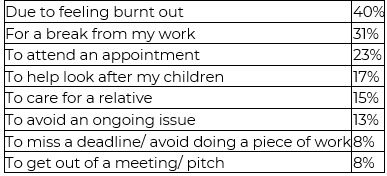Almost a third (30%) of employees admit they have or would consider ‘pulling a sickie’ to miss work, despite feeling healthy, according to new research from protection and employee benefits provider, MetLife UK
Some also feel they need extra time off work last minute due to personal circumstances. Almost a quarter (23%) say they took time off to attend a necessary appointment, while one in six (17%) did so due to emergency childcare issues, and 15% to care for a relative.
Top reasons why employees have or would ‘pull a sickie’ to skip working:

Of those who have previously called in sick, 45% have taken up to a week off. A third (31%) have taken up to three days, and 17% have taken less than a day.
Adrian Matthews, Head of Employee Benefits at MetLife UK commented: “Stress, declining productivity and a lack of engagement are all common signs of employee burnout. And with two in five employees citing this as a reason to call in sick, this could easily spiral into a larger problem and is something employers and managers need to pay careful attention to – especially as we’re at the start of a new full working year.
“While taking time off work should be encouraged in the workplace and is a vital part of balancing home/work life commitments and preserving mental health – it’s important to understand if there are bigger issues at the root. Not only might there be employees who are struggling due to burn out or worrying about childcare, but these sick days can quickly stack up and could cost businesses significantly, with losses in both time, money and potential for long-term retention issues.
“To help address these issues, it’s critical for businesses to deploy regular, effective, and varied communication about workplace employee health and wellbeing benefits and other supportive policies available. Whether that’s mental health support and wellness sessions, counselling, bereavement support or financial protection. Doing this consistently throughout the year will help maintain engagement, productivity, and overall happiness at work – as well as helping to remove any stigmas attached with needing a break – potentially leading to less longer term sickness absence.”


